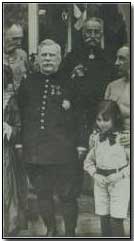Who's Who - Auguste Dubail
 Auguste
Dubail (1851-1934) was the French Army's Chief of Staff before the First
World War in 1911.
Auguste
Dubail (1851-1934) was the French Army's Chief of Staff before the First
World War in 1911.
With the outbreak of war in August 1914 however he returned to field command and was given the task of putting into operation France's prepared war strategy, Plan XVII, which called for the reclamation of the ceded territories (to Germany) of Alsace and Lorraine.
Dubail was handed command of the French First Army; he duly launched the ill-fated invasion of Lorraine in August 1914, ably repulsed by Crown Prince Rupprecht.
Nevertheless Dubail's successful defence of the heights of the Meuse steadied the whole French line, thereby avoiding a sweeping German rout during the crucial early weeks of the war.
1915 saw Dubail promoted and given command of the Eastern Army Group on the Western Front around Belfort and Verdun, where after initial satisfaction with French defences there he became convinced that a major German offensive against Verdun was brewing.
Consequently he called for more heavy artillery in defence of Verdun. However the French Commander in Chief, Joseph Joffre, was by no means convinced that Verdun was a likely target for a massed German attack; he therefore chose to ignore Dubail's warnings.
Nevertheless, once the German offensive at Verdun had begun - where German Chief of Staff Erich Falkenhayn proposed to "bleed France white" - Joffre apportioned blame upon Dubail, who was dismissed from command in March, a most public humiliation.
Dubail subsequently claimed (with some justification) that he had been made a scapegoat for Joffre's lack of foresight. Unfortunately for Dubail his initial public comments, prior to Verdun, where he played down the likelihood of a German attack there were put to effective use against him by Joffre.
Dubail took up a position as military governor of Paris, where he remained until Spring 1918, thereafter retiring from public life.
Auguste Dubail died in 1934.
A "creeping barrage" is an artillery bombardment in which a 'curtain' of artillery fire moves toward the enemy ahead of the advancing troops and at the same speed as the troops.
- Did you know?
